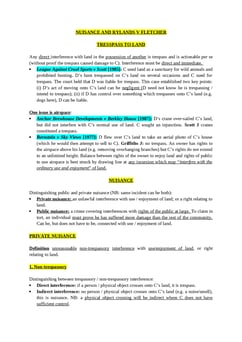Barnett v Chelsea Hospital [1969] 1 QB 428
Judgement for the case Barnett v Chelsea Hospital
Table Of Contents
KEY POINTS
The "but-for" test of causation asks whether, "but for" the defendant's negligence, the claimant's harm would have occurred. In other words, would the harm have occurred if the defendant had acted with reasonable care?
There was proximity since Plaintiff had presented himself at Defendant’s hospital, and that Defendant was negligent in not treating him.
However, it was not proven that on the balance of probabilities Plaintiff’s negligence caused Defendant’s death, since he might have died anyway if he had been admitted to the hospital.
FACTS
The facts of the case involved three night watchmen who fell ill after drinking tea laced with arsenic at the hospital's staff canteen. They were taken to the hospital's casualty department for treatment, but the doctor on duty failed to examine them thoroughly and simply sent them home.
One of the men died later that night from arsenic poisoning. However, it was unclear that even if he had been admitted to the hospital he would have survived.
The deceased’s widow sued for negligence.
COMMENTARY
This case established an important principle in negligence law – the "but-for" causation test. It is a straightforward and widely applied test that helps determine the defendant's liability for the claimant's harm.
ORIGINAL ANALYSIS
Plaintiff drank some tea which had been laced with arsenic and he presented himself at Defendant’s hospital since he was vomiting. Defendant told him to leave and call his own doctor. Plaintiff died, but it was unclear that even if he had been admitted to the hospital he would have survived.
Plaintiff’s widow sued for negligence.
-
The court held that there was proximity since Plaintiff had presented himself at Defendant’s hospital, and that Defendant was negligent in not treating him.
However it was not proven that on the balance of probabilities Plaintiff’s negligence caused Defendant’s death, since he might have died anyway if he had been admitted to hospital.
For Further Study on Barnett v Chelsea Hospital
Need instant answers? Our AI exam tutor is here to help.
Ask questions 🙋 Get answers 📔 It's simple 👁️👄👁️
Our AI is educated by the highest scoring students across all subjects and schools. Join hundreds of your peers today.
Get StartedSimilar Cases
Related Product Samples
These product samples contain the same concepts we cover in this case.

 Since 2010, Oxbridge Notes has been a trusted education marketplace, supplying high-quality materials from top achievers at universities like Oxford, Cambridge, LSE, Harvard, and Yale.
Since 2010, Oxbridge Notes has been a trusted education marketplace, supplying high-quality materials from top achievers at universities like Oxford, Cambridge, LSE, Harvard, and Yale.